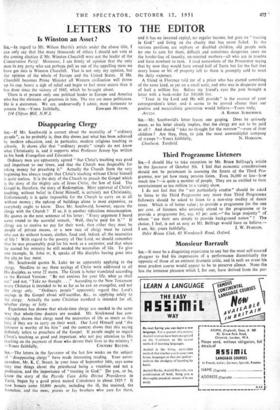Disappearing Clergy
sut.—if Mr. Southwold is correct about the mentality of "ordinary people", as he probably is, then this shows just what has been achieved by modern education, and, in particular, modern religious teaching in schools. It- shows alio' that " ordinary people" simply do not know what Christianity is, and it supports what Professor Jessop has written in his book Evangelism and Education.
Ordinary men are apparently agreed " that Christ's teaching was good and important to our times, and that the Church was despicable for taking money for preaching it." Actually the Church from the very beginning has always taught that Christ's teaching without Christ himself is quite useless. It is the duty of the Church to preach the Gospel which is the story of the mighty acts of Jesus Christ, the Son of God. The Gospel is, therefore, the story of Redemption. Mere approval of Christ's teaching, without belief in Christ Himself, is certainly not Christianity. Unfortunately it is quite impossible for the Church to carry on at all without money ; the upkeep of buildings alone is most expensive, as everybody ought to know. Does Mr. Southwold, however, equate the clergy with the Church ?' If so, it is another ridiculous misconception. He quotes in the next sentence of his letter: " Every argument I heard came round to the scornful remark, ' Well, they're paid for it.'" If clergy are to receive no pay for their work, then either they must be people of private means, or a new race of clergy must be raised who can do without houses, clothes, food and, indeed, all the necessities of life ! With regard to the poverty of Our Lord, we should remember that he was presumably paid for his work as a carpenter, and that when he started his ministry he still needed the necessities of life. To give one example, St. John iv, 8, speaks of His disciples having gone into the city,to buy meat.
Mr. Southwold quotes St. Luke xn as apparently applying to the clergy. Needless to say these sayings of Christ were addressed to all His disciples, as verse 22 states. The Greek is better translated according to the Revised Version: " Be not anxious for your life, what ye shall eat." and not, "Take no thought...." According to the New Testament every Christian is intended to be as far as he can an evangelist, and' not the clergy only. "Ordinary people" apparently regard Our Lord'i sayings in the Gospel about self-sacrifice, &c., as applying solely to the clergy. Actually the same Christian standard is intended for all, whether clergy or laity.
Experience has shown that whole-time clergy are needed in the same way that whole-time doctors are needed. Mr. Stockwood has con- vincingly shown that clergy need the necessities of life as much as the laity if they are to carry on their work. Our Lord Himself said "...she labourer is worthy of his hire " and the context shows that this saying definitely refers to preachers of the Gospel. If people ought to regard Christ's teaching as good and important, why not pay attention to His teaching on the payment of those who devote their lives to the ministry ?


































 Previous page
Previous page